Benjamin Netanyahu says killing of civilians in Israeli strike on Rafah a ‘tragic mistake’
Benjamin Netanyahu called the deaths of up to 45 civilians a ‘tragic mistake’, amid global condemnation of the strike on a displaced persons camp in Rafah.
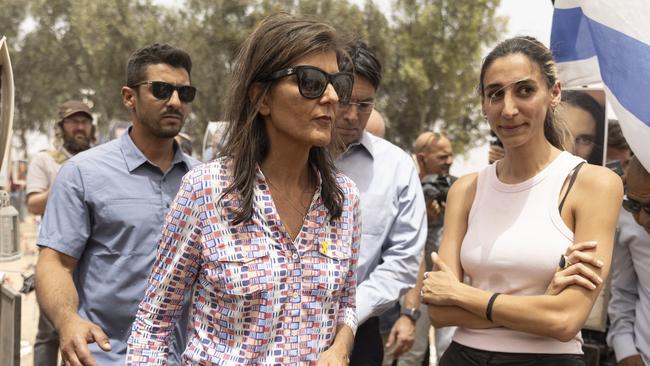
Prime Minister Benjamin Netanyahu of Israel called the deaths of civilians in an airstrike in the southern Gaza city of Rafah a “tragic mistake,” pledging an investigation as international condemnation mounted against the attack that Palestinian officials said killed dozens.
Israeli and Egyptian officials also held urgent talks on Monday after a rare cross-border clash between the two countries’ forces left an Egyptian officer dead, as they tried to prevent the situation from spiralling out of control.
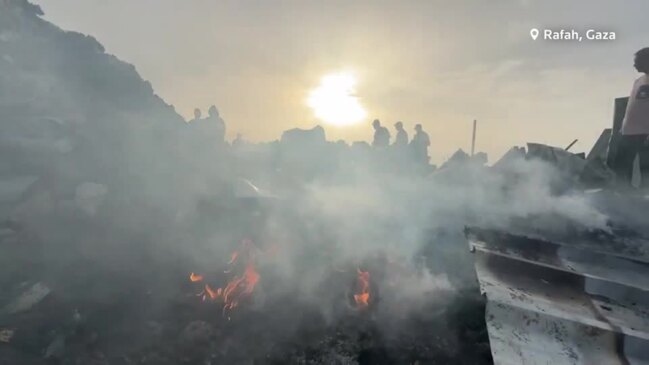
The civilian deaths, which came just days after the United Nations’ top court demanded that Israel halt some operations in Rafah, heightened international scrutiny of Israel’s war conduct, echoing the outcry over Israel’s military strike in April that killed seven aid workers in Gaza from World Central Kitchen.
A spokesman for the U.S. National Security Council said, “Israel has a right to go after Hamas, and we understand this strike killed two senior Hamas terrorists who are responsible for attacks against Israeli civilians. But as we’ve been clear, Israel must take every precaution possible to protect civilians.”
The UN Security Council called an emergency meeting on the Rafah strike and UN Secretary General Antonio Guterres condemned the attack.
“There is no safe place in Gaza. This horror must stop,” Guterres added in a social media post. Other UN officials called for a thorough investigation into the incident.
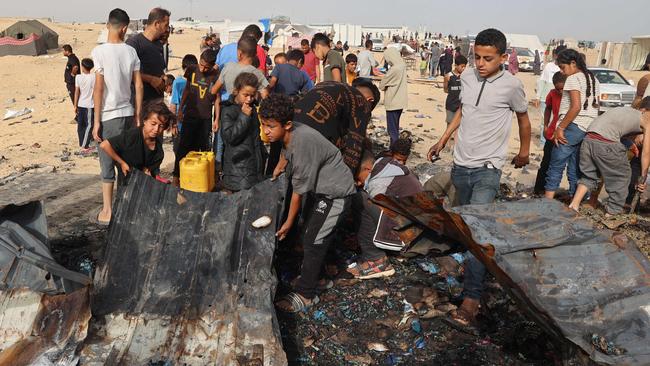
French President Emmanuel Macron said the airstrike, which took place Sunday night, was an “outrage.” European Union foreign-policy chief Josep Borrell condemned the Israeli attacks in Rafah on X and wrote that they must stop immediately.
Israel said the airstrike killed two top Hamas leaders and that it used small warheads that were precision-guided and aimed at an enclosed structure. Palestinian health officials said Israel’s attack led to the deaths of 45 Palestinian civilians and wounded others, including children and women.
Netanyahu, speaking before Israel’s parliament, said Israel would investigate Sunday’s attack and vowed to continue fighting. Israeli government spokesman Avi Hyman said Israel was seeking to limit civilian casualties and that “any loss of life, civilian life, is grave and is awful.”
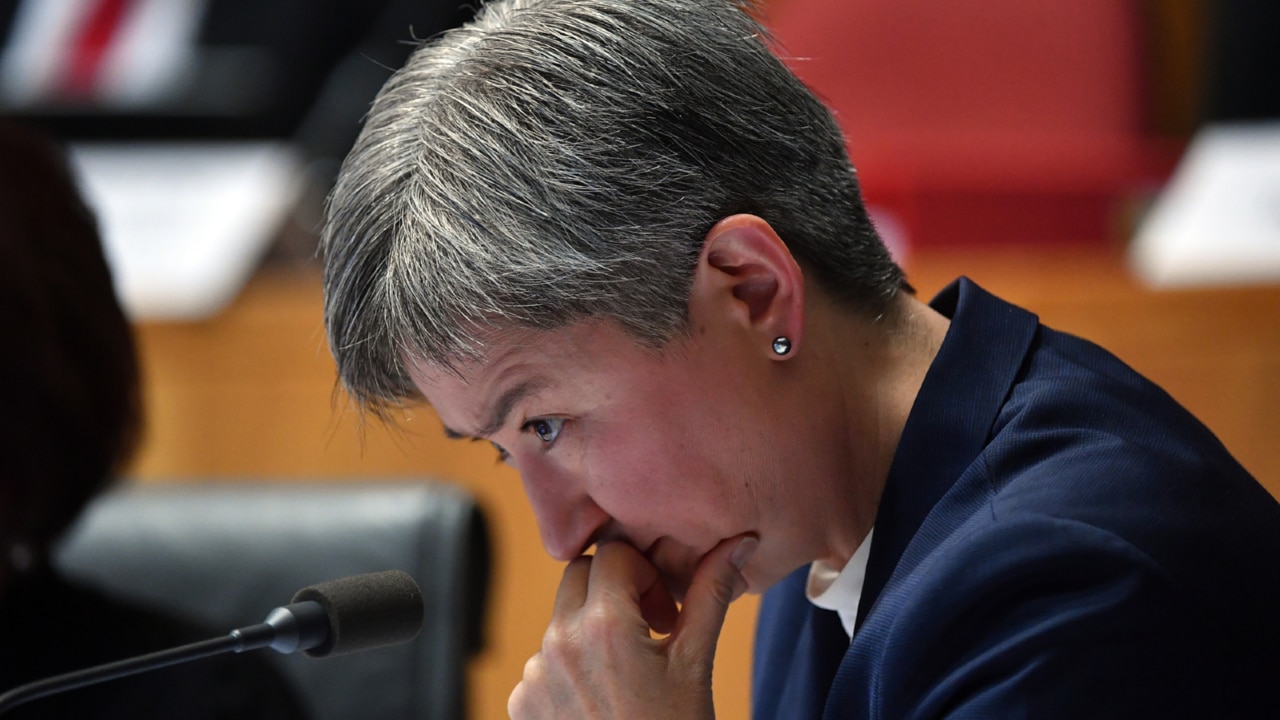
Hamas, which called on the international community to intervene, didn’t confirm any of its members had been killed. Israel launched an offensive on Rafah three weeks ago in hopes of destroying Hamas’s last military battalions and killing its leaders, who Israel says are likely hiding in tunnels beneath the city on the border with Egypt.
But even after Israel ordered Palestinians to evacuate from eastern Rafah, hundreds of thousands of people are estimated to remain in the city having fled the war in other parts of the Gaza Strip, presenting the riskiest battlefield yet for Israeli forces.
Before the strike, an Israeli intelligence assessment indicated that no women and children were inside the targeted compound, an Israeli official said. A review after the strike indicated, however, that a number of Palestinian civilians were killed from either the fire that followed or shrapnel from the strike, the official said.
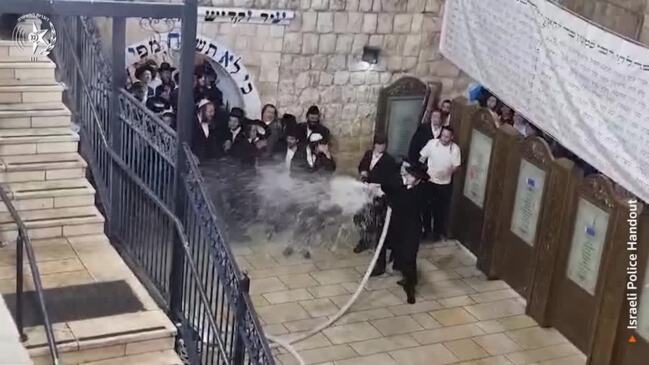
The U.S. has been watching closely to see how Israel would conduct the Rafah operation and pressured Israel to lower the civilian toll. But a senior administration official said last week that the Biden administration had gained confidence that an expanded operation could go ahead after Israeli officials recently briefed national security adviser Jake Sullivan on their revised plans to address potential harm to civilians and evacuations from the area.
Meanwhile, the shooting incident with Egyptian forces on the border threatened to deepen Egypt’s rift with Israel over its military offensive. Egypt threatened to downgrade its diplomatic ties with Israel after the Israeli military seized control of the Gazan side of the border crossing to halt what it says is the smuggling of arms and funds across the border. Egypt has also said it would join South Africa’s court case charging Israel with genocide.
The Egyptian Armed Forces said Monday’s shooting led to “the martyrdom of a security agent” who Egyptian officials confirmed was on their side of the border. People familiar with the incident said Egyptians opened fire first and the Israelis responded, and that no Israelis were killed.
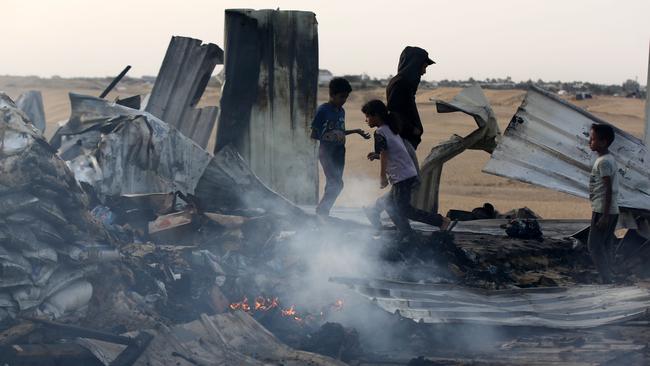
Later, a senior Egyptian official said an initial investigation showed that shooting broke out between Israel and Palestinian factions and that Egyptian security forces “took protective measures.” Other Egyptian officials said there were no clashes between Israelis and Palestinians in the area.
Egyptian and Israeli officials were engaged in discussions to calm heightened tensions, the Egyptian officials said, amid worries of a miscalculation that could trigger a war between the two countries after 45 years of peace.
More than 800,000 people have fled Rafah since the Israeli military ordered an evacuation of the eastern part of the city on May 6, but the city’s mayor estimates that around 500,000 remain as they struggle to find another place to take shelter. The area where the Israeli strike took place Sunday was especially densely populated, with families having set up tent encampments in the belief that the area would be safer.
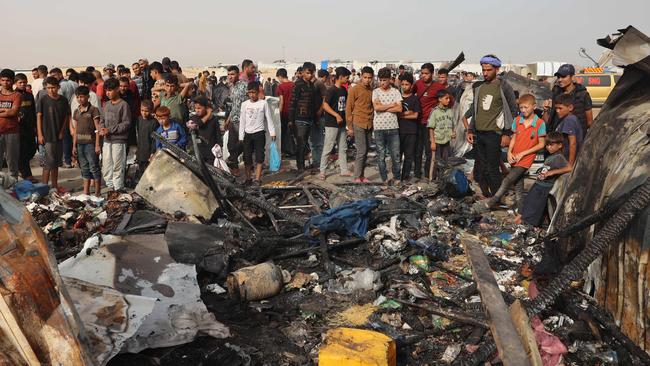
Israel’s strike caused huge explosions in a tent encampment where Palestinian civilians were sheltering, witnesses said. Video footage from Reuters showed people trying to extinguish a fire in the dark of night as screaming can be heard in the background, as well as families standing among rubble and burned items the following day.
Other Reuters footage showed crying children being treated for injuries at a Rafah hospital, as men brought bodies in white bags to a nearby field clinic.
The unnamed Israeli official provided a video to The Wall Street Journal showing a rectangular structure being demolished on Sunday. The Israeli military said one of its aircraft struck a Hamas compound in Rafah where it said militants were operating.
It named the two Hamas officials killed in the strike as Yassin Rabia and Khaled Nagar, who it said were behind several deadly attacks against Israel. The Journal was unable to independently confirm their deaths.
The strike on Sunday night took place in the western Rafah neighbourhood of Tel Al-Sultan, just south of a stretch of beach called Al-Mawasi that Israeli authorities have designated as a humanitarian area, according to the Israeli military and some Palestinian witnesses. Israeli military officials said the strike wasn’t within the humanitarian area itself, while Palestinians said they believed it was.

Ahmed Al Sufi, the Palestinian mayor of Rafah, cited a leaflet that the Israeli military had issued to residents that said the humanitarian area would extend to a block labelled 2371 where Al Sufi said the strike took place. A map on the leaflet below the Arabic text, however, didn’t show the block in yellow highlights like the rest of the humanitarian area.
In a post on X, the Palestine Red Crescent Society said that several tents were hit by Israel’s military and caught fire, leaving people trapped inside. The humanitarian organisation said it believed the site of the attack to have been within the Israeli authorities’ designated humanitarian zone. “Citizens were coerced into evacuating to it,” the Red Crescent Society wrote.
Earlier this month, Israel’s military had instructed families in eastern Rafah to move to a humanitarian area that includes Al-Mawasi and neighbourhoods west of the Salah al-Din Road that roughly bisects the Gaza Strip. The evacuation, which prompted many humanitarian workers in Rafah to also leave, didn’t encompass Tel Al-Sultan.
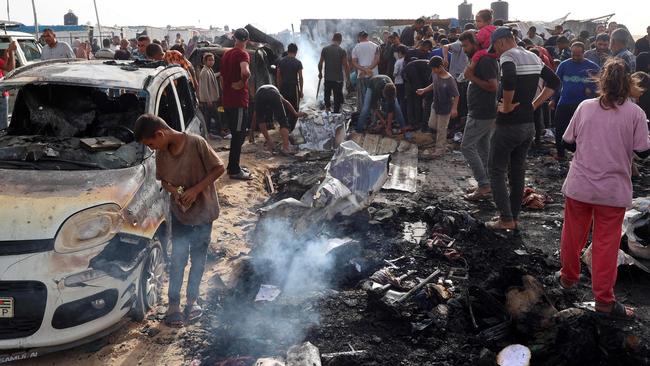
Emad Fakhry Jaber, a father who was sheltering in Tel Al-Sultan in a tent with his seven children, said the family heard a sudden explosion and saw the sky light up around 11pm on Sunday. He said the destruction seemed to be centred not far from where he was, but that the family stayed put because they had nowhere else to go. Earlier in the month, he had tried to find a place to shelter in Al-Mawasi without success.
“My kids were crying, all my family was crying,” he said. “I am also afraid, but what can I do?” At daybreak Monday, Jaber said he saw several dead bodies being carried toward a makeshift medical point in Tel Al-Sultan.
Maysoon Shawqi, who was staying in nearby Al-Mawasi, said that she was so close to the strike and subsequent fire that she feared the flames would reach her family’s tent.
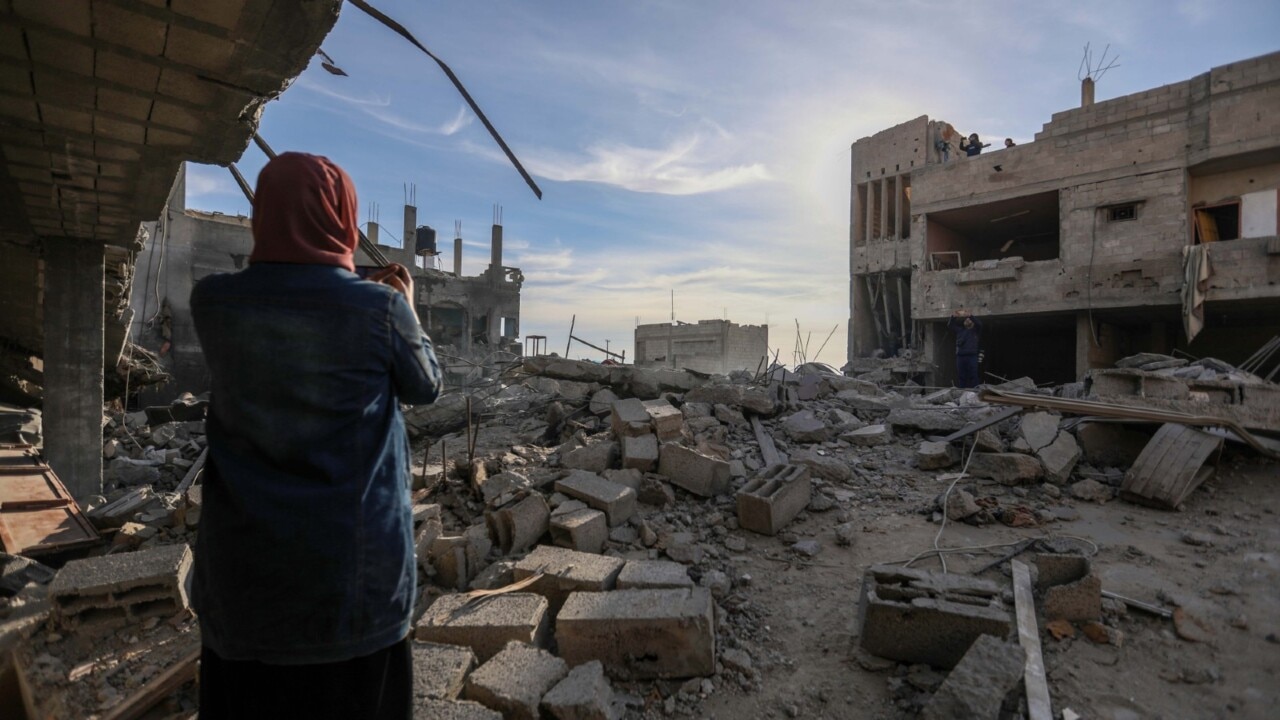
“I heard screaming, saw people running, and the whole situation was so scary,” said the 19-year-old, who has lost close family members in the current conflict. “This is supposed to be a safe area, but this is why we say you can be killed anywhere.”
Gaza’s health authority said Monday that 190 civilians had been killed across the Gaza Strip over the preceding 24 hours, including the 45 killed in Tel Al-Sultan. The Israeli military said it struck 75 targets across Gaza in the past day, including weapons caches and other militant infrastructure.
The ICJ’s provisional order Friday didn’t detail any specific military actions it believed Israel needed to stop as part of its Rafah operations. Israeli officials have denounced the order and said their country needs to continue fighting in Rafah to free Israeli hostages and to destroy Hamas for the sake of its own self-defence. Earlier on Sunday, Hamas had used the Rafah area to launch eight rockets toward Israel’s densely populated central core, the first such attack in more than four months.
Fatima AbdulKarim, Saleh al-Batati and Dov Lieber contributed to this article.
The Wall Street Journal



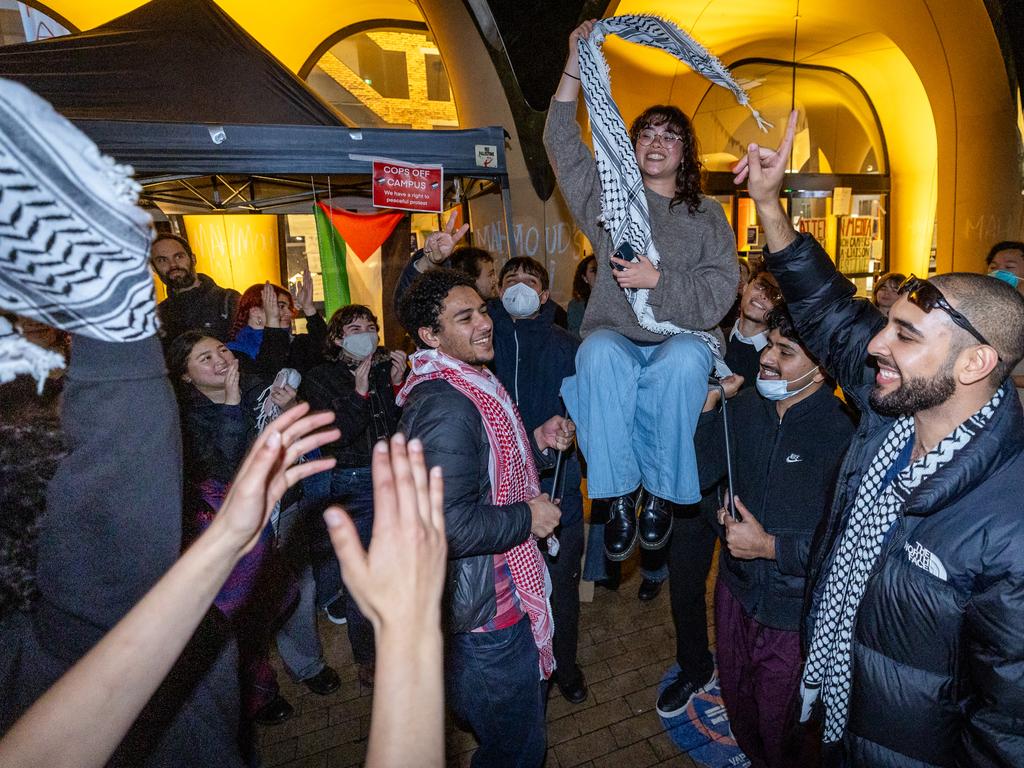
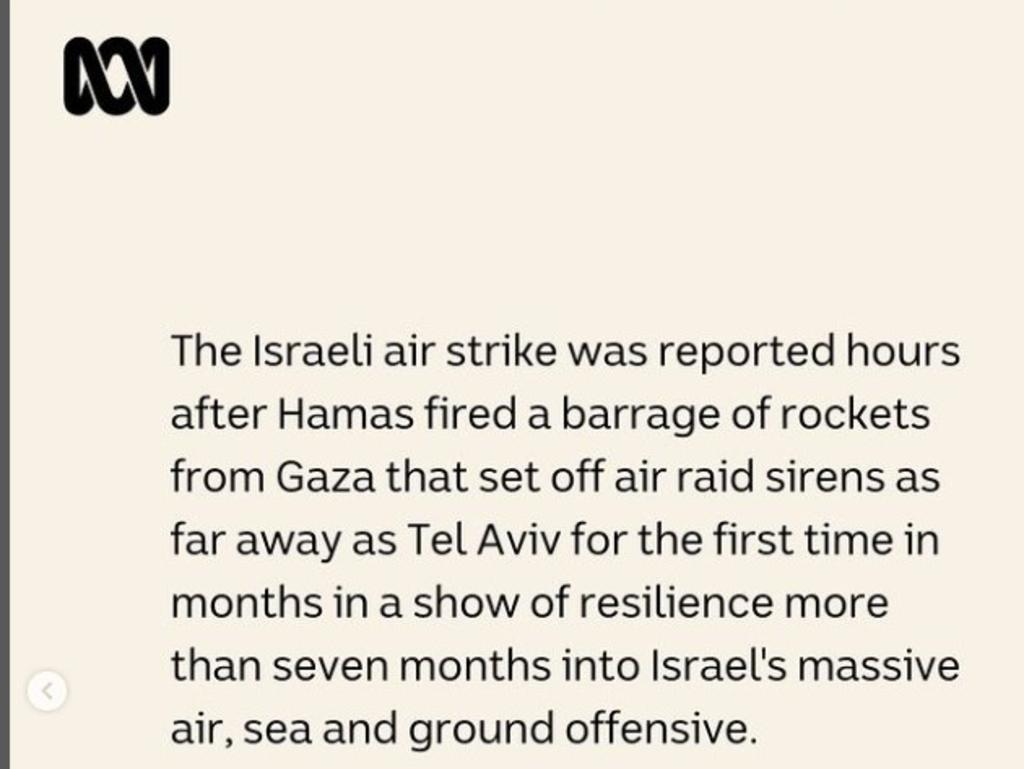


To join the conversation, please log in. Don't have an account? Register
Join the conversation, you are commenting as Logout